Aline Sousa, the Brazilian recycler who put the presidential sash on Lula: ‘Recycling has a race and a gender’
From a childhood marked by hunger to running one of the world’s largest waste management plants, the activist fights for the rights of those who transform trash into sustenance
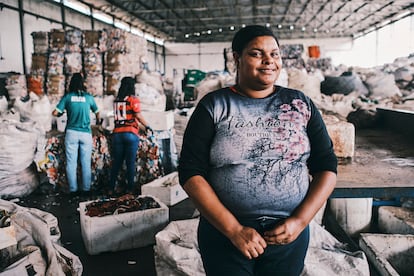

At a recycling plant in Brasília, the capital of Brazil, the face of a Black woman decorates the wall of the plastic separation area.
The woman portrayed is María Carolina de Jesús, author of a Portuguese-language diary that, in English, is translated as Junk Room. In the work, she recounts her routine as a garbage collector on the streets of São Paulo in the 1950s. It was the best-selling book in the country for months, portraying poverty, state neglect, as well as the intellectual capacity silenced by Latin American inequality.
Today, 65 years after the diary’s publication, Aline Sousa — director of the largest recycling center in Brazil and one of the largest in the world — takes a phrase from the book as a guide: “Hunger was created by those who are not hungry.”
Sousa, 34, knows hunger firsthand. At the age of eight, she began working, selling sweets on the street. And, by the age of 12, she overcame her fear of horses and rode a recycling wagon for the first time, accompanying her grandmother. “I would leave school and make sure that she wouldn’t get hurt in the trash or in traffic,” Sousa recalls. Together, they would travel around Brasília, collecting recyclable materials, mainly aluminum cans.
She now directs the Central de Cooperativas de Trabajo de Materiales (CENTCOOP) — the Recyclable Materials Cooperative Center — which was founded in 2006. The leading organization brings together 22 cooperatives in a 818,000-square-foot space. Each year, the workers process around 12,000 tons of waste. However, in the Federal District — the city’s central-western region — 60% of the recyclable material collected by the public service is ultimately lost, due to improper handling.
“More than 600 tons per month arrive at our plant in conditions that impede their recovery,” Sousa explains. The compaction of waste mixed with organic material also exacerbates the problem. Still, despite this challenge, door-to-door collection by specialized cooperatives achieves a recycling rate of over 80%.
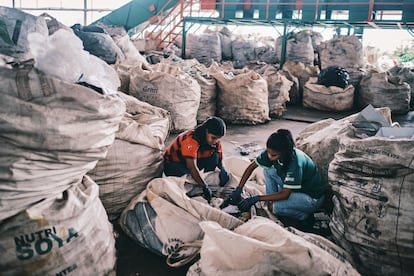
Sousa — like De Jesús — represents a reality that’s still true today. In Brazil, more than 70% of those who work with solid waste recycling — paper, cardboard, cans, cartons, plastic bottles, glass, as well as other types of waste, such as metal, wood and batteries — are women. And more than 80% are Black, according to the country’s Recycling Atlas.
“Recycling is a race and a gender issue,” says Sousa. Furthermore, in Brazil, more than 800,000 people depend directly on this activity for their livelihoods and are responsible for two-thirds of the waste that reaches the recycling industry in the country. According to the Brazilian Waste Association (ABREMA), municipal collection accounts for only a third. More than 1,000 people work at the plant that Aline Sousa manages, including her grandmother and mother.
Sousa has established herself as a female activist and leader, attracting the attention of the authorities. Her career — which includes environmental training, participation in political movements and the study of new waste management technologies — has led her to sit down and speak with mayors and governors on several occasions. “In Brazil, what they expect from garbage collectors is the use of violence when we fight for our rights or improved conditions,” she explains. This is how she came to understand that “diplomacy is for everyone and needs to be transversal.”
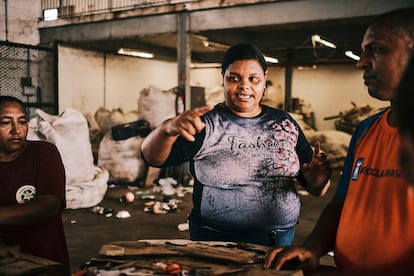
In Brazil, the National Solid Waste Policy recognizes recyclable material collectors as key players in waste management. The legislation establishes — among other things — goals for the elimination of open-air dumps, as well as the social and economic inclusion of these workers. However, the law’s implementation in municipalities remains deficient, while discrimination against this group persists, according to the International Labor Organization (ILO).
On a more intimate note, Sousa acknowledges the harsh reality her colleagues face. With a monthly salary of around $250, each day represents a constant challenge. “When you come home and find a hungry child, a sick relative, or a homeless person, it’s hard to find a reason not to be combative; those who demand peace do so with a full stomach,” she laments.
The impact of her words has resonated throughout the country, reaching the top echelons of power. In 2021, shortly before launching his third election campaign, Brazilian President Lula da Silva toured the country to reconnect not only with voters, but also with organized social movements. Brasília — his home for two previous terms (2003-2011) — became one such setting. Standing at the separation line where trucks deposit garbage, Sousa recalls, “Lula was here, hand in hand with our workers, for a day.”
Sousa took advantage of a coffee break. In a moment of desperation, she personally asked Lula to intercede with the governor of the Federal District to avoid paying land taxes during the pandemic. This request was made out of an urgent need for assistance, as the collectors’ families were facing serious financial hardship. “I think he achieved it with one phone call. I thought, ‘I will never see this man again in my life.‘” That day marked a turning point in the struggle.
The 2022 elections in Brazil were fought until the final moments. With 51% of the vote, Lula defeated his predecessor, Jair Bolsonaro. Traditionally, the outgoing president hands over the presidential sash to his successor as a symbol of the democratic transition, but Bolsonaro questioned the results and, in protest, refused to participate in the ceremony. In 2025, an investigation by the Brazilian Public Prosecutor’s Office revealed that, at the time, the far-right leader was planning a coup d’état. Without a definitive name for the event, the transition team — led by the current first lady, Janja da Silva — opted for an unprecedented act: the presidential sash would be given over by the hands of the people.
Seven people accompanied the president up the ramp of the presidential palace: an Indigenous leader, a metalworker, a teacher, a cook, a child, a person living with a disability, and an Afro-Brazilian woman. With braids in her hair, wearing a t-shirt with the logo of the National Movement of Brazilian Waste Pickers (MNCR), she was the one who presented Lula with the sash. That woman was Sousa.
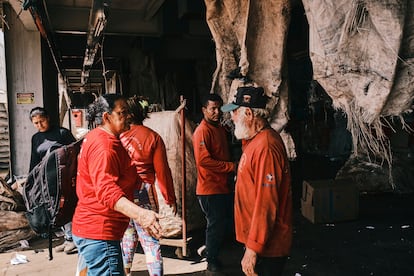
Days before the inauguration, Lula’s personal photographer — Ricardo Stuckert — secretly invited her to a meeting. “He called me and asked me to be discreet, but I told my mother immediately,” she remembers. “Until the last moment, they tried to stop me, because of threats of an attack [on Lula]. But I said: ‘if I go up there and something happens, I’ll throw myself in front of him.’ That day, I wanted to represent democracy,” she adds.
After the ceremony, her image was plastered all over major news sites. “I imagine that, since María Carolina de Jesús, there hasn’t been another Black recycler who has given so many interviews,” she says with a laugh. But the euphoria was short-lived. January 8, 2022, was marked by the storming of the Brazilian Congress by Bolsonaro supporters. Aline received threats in her neighborhood and on social media. “I went into hiding, because I felt I had to protect my family,” she confesses.
Inside the recycling plant, the memories of that day are kept alive. A framed photo reflects the satisfaction of representing an often-forgotten group. At 80, María de Lourdes de Sousa is the oldest active recycler in the Brazilian capital: she’s affectionately known as “Grandma” among the workers. She remembers the day that Lula took office, when she saw herself in Aline. “I went up to heaven and came back,” she sighs, hugging the young woman who — despite sharing her last name — is not her relative.
Recycling has given many women independence from their families. María’s sister, for example, was the first female president of a recyclers’ association in Brasília. “If I am where I am, it’s because of her example,” she acknowledges. But her tone hardens when asked if any of her seven children work at the plant. “Sometimes, when they complain, I feel like bringing them, so that they can see the effort it takes.” But then, she adds: “No one wants a child to find food scraps, scatological elements, human or animal skin mixed in with their work.”
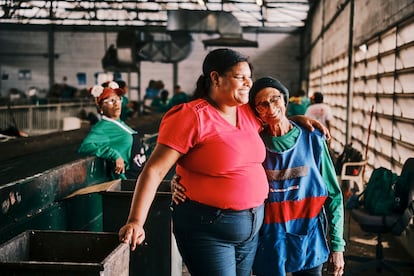
In Brazil, only 8% of solid waste is recycled. And, when it reaches recycling plants, barely 50% can be processed due to organic contamination, according to ABREMA. For Sousa, dealing with organic waste is key to ensuring the health and safety of collectors. This principle guides her work at the plant: “When I understood that, by treating organic waste, I would be able to treat solid waste, I understood the key to my work,” she tells EL PAÍS in her office, surrounded by awards and mementos from her travels. Thanks to her management, more than half of the neighborhoods in Brasília — a city of three million inhabitants — now have selective collection, in addition to a system for collecting waste from street markets throughout the city.
Sousa will step down in the first-half of 2025. When asked about the two achievements under her tenure that she considers to be the most important, she humbly replies: “The daycare center and the community kitchen [at the plant].” Both initiatives are deeply connected to her own life, since, as she reflects, “they’re the opportunities I would have liked to have had. They allow parents to work peacefully, knowing that their children are well cared for and fed.”
These achievements not only address immediate needs, but also reflect a lesson learned from Carolina María de Jesús, who once said that “hunger is a teacher.” To this, Aline adds: “Books are more worthy teachers.”
Translated by Avik Jain Chatlani.
Sign up for our weekly newsletter to get more English-language news coverage from EL PAÍS USA Edition
Tu suscripción se está usando en otro dispositivo
¿Quieres añadir otro usuario a tu suscripción?
Si continúas leyendo en este dispositivo, no se podrá leer en el otro.
FlechaTu suscripción se está usando en otro dispositivo y solo puedes acceder a EL PAÍS desde un dispositivo a la vez.
Si quieres compartir tu cuenta, cambia tu suscripción a la modalidad Premium, así podrás añadir otro usuario. Cada uno accederá con su propia cuenta de email, lo que os permitirá personalizar vuestra experiencia en EL PAÍS.
¿Tienes una suscripción de empresa? Accede aquí para contratar más cuentas.
En el caso de no saber quién está usando tu cuenta, te recomendamos cambiar tu contraseña aquí.
Si decides continuar compartiendo tu cuenta, este mensaje se mostrará en tu dispositivo y en el de la otra persona que está usando tu cuenta de forma indefinida, afectando a tu experiencia de lectura. Puedes consultar aquí los términos y condiciones de la suscripción digital.
